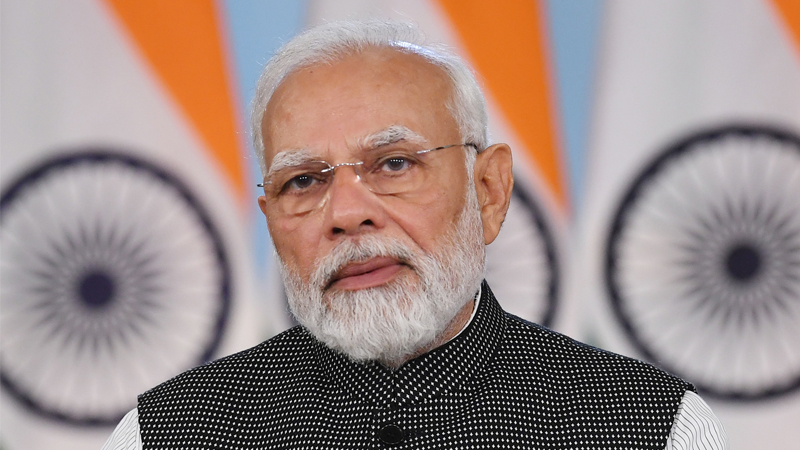The Prime Minister, Shri Narendra Modi, addressed a Budget Webinar on the subject of ‘Reaching the last mile’. It is the fourth of a series of 12 post-budget webinars organized by the government to seek ideas and suggestions for the effective implementation of the initiatives announced in the Union Budget 2023.
At the outset the Prime Minister, while acknowledging the importance of the debate on Budget in Parliament, said that the government has gone a step further and for the last few years have started the new tradition of brainstorming with the stakeholders after the Budget. “This is important from the point of view of implementation and time-bound delivery. This also ensures proper utilization of every penny of taxpayers money”, he said.
The Prime Minister said that along with money, political will is needed for the development. Emphasizing the importance of good governance and constant monitoring for the desired goals, the Prime MInister said “The more emphasis we put on good governance, the more easily our goal of reaching the last mile will be accomplished.” He gave the example of new approaches in the immunization and vaccine coverage in Mission Indradhanush and Corona pandemic to illustrate the power of good governance in the last mile delivery.
Explaining the thinking behind the policy of saturation, the Prime Minister said that the approach of reaching the last mile and saturation policy complement each other. He said as opposed to the earlier scenario when the poor were running after the government for basic facilities, now the government is reaching the doorstep of the poor. “The day we decide that every basic facility will be provided to every citizen in every area, then we will see what a big change will come in the work culture at the local level. This is the spirit behind the policy of saturation. When our aim is to reach everyone, then there will be no scope for discrimination and corruption. And only then, we will also be able to complete the goal of reaching the last mile”, the Prime Minister added.
Giving examples of this approach, the Prime Minister cited PM SVANidhi Scheme that linked the street vendors to formal banking, Development and Welfare Board for De-notified, Nomadic and Semi-Nomadic Communities, 5 lakh common service centers in villages and milestone of 10 crore cases of tele-medicine.
The Prime Minister said that this year’s Budget has paid special attention to taking the mantra of reaching the last mile to tribal and rural areas. He said that for this, thousands of crore rupees have been allocated to the Jal Jeevan Mission. He said that work has started on more than 60 thousand Amrit Sarovar, out of which 30 thousand Sarovars have already been constructed. “These campaigns are improving the standard of living of those Indians living far and wide, who have been waiting for such facilities for decades. We do not have to stop here. We have to create a mechanism for new water connections and the pattern of water consumption. We also have to review what can be done to further strengthen the water committee”, he said.
The Prime Minister asked the stakeholder to discuss the ways of linking housing with technology for finding ways of making strong but affordable houses, finding easy ways of benefiting from solar power and group housing models acceptable in both urban and rural areas. He said that this year’s Budget has kept Rs 80 thousand crore for housing for the poor.
The Prime Minister said “for the first time, the country is tapping the huge potential of the tribal society of our country at this scale. Tribal development has been given prominence in this budget as well.” Referring to the robust allocations for the staffing of the Eklavya Residential Schools, the Prime MInister asked the gathering to see the feedback from the teachers and students from these schools and how students of these schools can get exposure of the big cities. He asked them to deliberate on the ways of creating more Atal Tinkering Labs in these schools and workshops for aspects related with startups.
The Prime Minister said that for the first time a special mission is being launched for the most deprived among the tribal communities. “We have to rapidly provide facilities to our tribal friends in more than 22 thousand villages in more than 200 districts of the country. The Prime Minister also mentioned Pasmanda Muslims in this regard. A target has also been set in this budget to completely get rid of sickle cell. For this Whole of the nation approach is needed. That’s why every stakeholder related to health will have to work fast”, he added.
The Aspirational District Program has emerged as a successful model in terms of Reaching The Last Mile, the Prime Minister said. Taking this approach further, an Aspirational Block programme is now being started in 500 blocks of the country. “For the Aspirational Block programme, we have to work keeping in mind the comparative parameters in the same way as we have worked for the Aspirational Districts. We have to create an environment of competition with each other at the block level as well”, the Prime Minister concluded.


